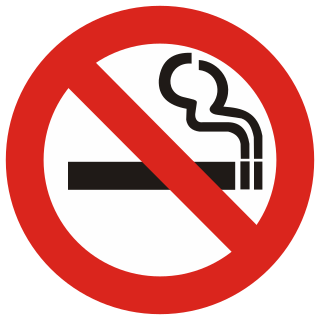| Death in the West | |
|---|---|
| Directed by | Martin Smith |
Release date |
|
Running time | 32 minutes |
| Country | United Kingdom |
| Language | English |
Death in the West is a 1976 documentary film directed by Martin Smith, [1] which is believed to contain the first recorded admission from a tobacco company representative that smoking causes health problems.
It was filmed by reporter Peter Taylor alongside a team from the United Kingdom current affairs program This Week. The film aired only once in the UK, from London in September 1976 on Thames Television, to an audience of approximately 12 million viewers, before a court order was obtained preventing it from being re-aired. [1]
The film is composed of three different kinds of footage: old Marlboro commercials, interviews with two Philip Morris executives, and interviews with six American cowboys who have either lung cancer or emphysema, alongside testimony from physicians that the conditions were caused by heavy cigarette use. [1]
The film interviews James Bowling, senior vice president and director of corporate affairs for Philip Morris, as well as Helmut Wakeham, vice-president for the company's USA science and technology department. [1] The interview with Wakeham is believed to be the first recorded admission from a tobacco company representative that smoking causes health problems. [2]
Yeah, cigarettes are [...] So what are we to do, stop living? The best way to avoid dying is not to be born you know. And if one avoided doing all the things which are alleged to be harmful to people these days we would vegetate in a mountain cave.
— Helmut Wakeham (Philip Morris USA) responding to being questioned if cigarettes are unhealthy
Wakeham was also criticised for comparing the ill-effects of smoking to overconsumption of apple sauce. [1]
Shortly after the film aired, Philip Morris sued Thames Television, successfully obtaining a court order to prevent the film from being shown until its suit could be heard and preventing the filmmakers from publicly discussing the film. Philip Morris' suit accused Thames of both deception and breach of copyright, stating the firm was "sandbagged and double-crossed" into allowing Marlboro commercials to be used in the film, as they thought the film would depict cigarettes in a more favourable manner. Both Mother Jones magazine and The Glasgow Herald doubted this claim, since Peter Taylor had previously made three films for television which portrayed cigarette use in a negative manner. [1] [2] Philip Morris also spent "considerable money" in an attempt to prove the six individuals in the film were not genuine cowboys. [1]
"They sent a couple of lawyers from Kansas City to see me. They just showed up on my doorstep [...] They wanted to prove that maybe other things than cigarettes had caused my emphysema. They were very sly in their questions. [...] They wanted to know how long I had been in the cattle business, was it my vocation or avocation? I've had this ranch 20 years, but they tried to make a big thing of the fact that some of that time I was also teaching school."
— John Holmes, cowboy who was interviewed in the film [1]
Palmer Williams, then senior producer for 60 Minutes in the US, had expressed interest in airing part of the documentary, and the American Cancer Society had plans to use the film in their anti-smoking campaigns. The court order, however, prevented Thames from selling them the film. [1]
Philip Morris stated they would settle out of court, if Thames returned all the footage of the commercials and Phillip Morris employees, thereby effectively destroying the majority of the film. [1] Although Thames' chances of winning the lawsuit were described as good, [1] the filmmakers did not mount a lawsuit to recover the film, as a defence was estimated to cost £100,000, far greater than the amount of money the company could make by recovering and selling the film. [2] Thames eventually settled out of court, signing a confidential agreement that stated they would destroy all their copies of the film. [2] In January 1979, the original film was reported to be sealed in a London court vault. [1] [3]
By January 1979, four of the six cowboys interviewed in the film had died; [1] [3] only one was still alive in 1982. [2] James Bowling died of pancreatic cancer in 1997. [4]
Despite Thames' having agreed to destroy all copies of the film, both the film and photocopies of the confidential agreement leaked out. [2] Stanton Glantz of the University of California obtained an unlicensed copy, which he screened at a public seminar in May 1982. [2] He also gave a copy to San Francisco TV station KRON-TV, which also aired it that month. [5] The film was also shown twice during the penultimate weekend of January 1983 on Chicago's WTTW as an installment of Image Union . [6]

The tobacco industry comprises those persons and companies who are engaged in the growth, preparation for sale, shipment, advertisement, and distribution of tobacco and tobacco-related products. It is a global industry; tobacco can grow in any warm, moist environment, which means it can be farmed on all continents except Antarctica.

Marlboro is an American brand of cigarettes owned and manufactured by Philip Morris USA within the United States and by Philip Morris International outside the US. In Canada, a separate product using the Marlboro brand is owned and manufactured by Imperial Tobacco Canada, while the international product is distributed in Canada by a unit of PMI under the name "Rooftop". Marlboro's largest cigarette manufacturing plant is located in Richmond, Virginia.
Philip Morris USA is an American tobacco company. They are a division of the American tobacco corporation Altria Group. It has been the leading cigarette manufacturer in the U.S. since the late 20th century. Its major brands include Marlboro, Virginia Slims, Benson & Hedges, Merit, and Parliament.

The Marlboro Man is a figure that was used in tobacco advertising campaigns for Marlboro cigarettes. In the United States, where the campaign originated, it was used from 1954 to 1999. The Marlboro Man was first conceived by advertising executive Leo Burnett in 1954. The images initially featured rugged men portrayed in a variety of roles but later primarily featured a rugged cowboy or cowboys in picturesque wild terrain. The ads were originally conceived as a way to popularize filtered cigarettes, which at the time were considered feminine.
Wayne McLaren was an American stuntman, model, actor, and rodeo performer.

David McLean was an American film and television actor, best known for appearing in many Marlboro television and print advertisements beginning in the early 1960s.

Philip Morris International Inc. (PMI) is an American multinational tobacco company, with products sold in over 180 countries. The most recognized and best selling product of the company is Marlboro. Philip Morris International is often referred to as one of the companies comprising Big Tobacco.
Operation Berkshire is the name of a program initiated in 1976 by seven of the world's major tobacco companies aimed at promoting "controversy" over smoking and disease.

Smoking in Uruguay in enclosed public spaces became illegal on 1 March 2006. On that date, bars, restaurants or offices where people are caught smoking began facing fines of more than $1,100 or a three-day closure. Uruguay was the first country in Latin America to ban smoking in enclosed public spaces.
Stanton Arnold Glantz is an American professor, author, and tobacco control activist. Glantz is a faculty member at the University of California, San Francisco (UCSF) School of Medicine, where he is a Professor of Medicine (retired) in the Division of Cardiology, the American Legacy Foundation Distinguished Professor of Tobacco Control, and former director of the Center for Tobacco Control Research and Education. Glantz's research focused on the health effects of tobacco smoking.

Godfrey Phillips India Ltd. (GPI) is a tobacco manufacturer headquartered in India. It is now a part of Modi Enterprises. The company is a major player in the domestic cigarette industry. In 2013-2014 it reported an annual turnover of Rs 4,220 crores. It has expanded from tobacco to include tea, pan masala, and confectioner. Its operations are primarily located in the northern and western parts of India, but it has recently expanded into West Bengal and the southern part of the country. It sells some of the most popular cigarette brands, such as Four Square, Red and White, Cavanders, Tipper, and North Pole.

Cipollone v. Liggett Group, Inc., 505 U.S. 504 (1992), was a United States Supreme Court case. In a split opinion, the Court held that the Surgeon General's warning did not preclude lawsuits by smokers against tobacco companies on the basis of several claims. The case examined whether tobacco companies could be liable for not warning the consumer "adequately" of the dangers of cigarettes as well as ultimately held the stance that smoking was in fact a free choice. The ruling also questioned the Cigarette Labeling and Advertising Act of 1965 to determine whether the warning labels on the cigarette products by law had to be less or more alarming than the warning issued.

Tobacco politics refers to the politics surrounding the use and distribution of tobacco, likewise with regulations.

The Family Smoking Prevention and Tobacco Control Act, is a federal statute in the United States that was signed into law by President Barack Obama on June 22, 2009. The Act gives the Food and Drug Administration the power to regulate the tobacco industry. A signature element of the law imposes new warnings and labels on tobacco packaging and their advertisements, with the goal of discouraging minors and young adults from smoking. The Act also bans flavored cigarettes, places limits on the advertising of tobacco products to minors and requires tobacco companies to seek FDA approval for new tobacco products.

Tobacco smoking has serious negative effects on the body. A wide variety of diseases and medical phenomena affect the sexes differently, and the same holds true for the effects of tobacco. Since the proliferation of tobacco, many cultures have viewed smoking as a masculine vice, and as such the majority of research into the specific differences between men and women with regards to the effects of tobacco have only been studied in-depth in recent years.

Regulation of tobacco by the U.S. Food and Drug Administration began in 2009 with the passage of the Family Smoking Prevention and Tobacco Control Act by the United States Congress. With this statute, the Food and Drug Administration (FDA) was given the ability to regulate tobacco products.
Naugle v. Philip Morris was a landmark 2009 court case in which a jury awarded the plaintiff Lucinda Naugle $300 million. The award included $56.6 million in compensatory damages for medical expenses and $244 million in punitive damages. At the time, the verdict was the largest award given to an individual suing a tobacco company, and was featured on NBC, ABC, 60 Minutes, and The New York Times. In 2012, the verdict amount for punitive damages was reduced to $36.8 million.
"Tobacco" is a segment of the HBO news satire television series Last Week Tonight with John Oliver about the tobacco industry. It first aired on February 15, 2015, as part of the second episode of the series' second season. During the eighteen-minute segment, comedian John Oliver discusses tobacco industry trends and practices.

As nicotine is highly addictive, marketing nicotine-containing products is regulated in most jurisdictions. Regulations include bans and regulation of certain types of advertising, and requirements for counter-advertising of facts generally not included in ads. Regulation is circumvented using less-regulated media, such as Facebook, less-regulated nicotine delivery products, such as e-cigarettes, and less-regulated ad types, such as industry ads which claim to discourage nicotine addiction but seem, according to independent studies, to promote teen nicotine use.

Iqos is a line of heated tobacco products designed to be used with tobacco and zero-tobacco nicotine-containing consumables. They are manufactured by Philip Morris International (PMI). The brand was first introduced in November 2014 in Japan and Italy. At the end of 2023, smoke-free products made up nearly 40% of PMI's total net revenue and gross profit, with Iqos surpassing Marlboro in terms of net revenue.